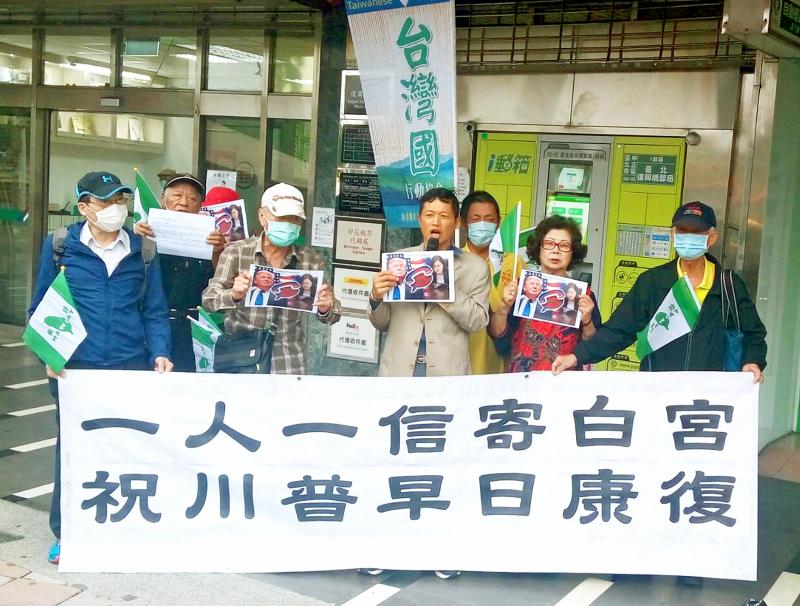Taiwanese independence campaigners yesterday launched a drive to send letters and get-well cards to wish US President Donald Trump a speedy recovery from COVID-19.
At a rally in front of a post office across from the Executive Yuan in Taipei, the campaigners thanked the US for helping to protect the nation from China’s military provocations, which upset regional stability.
The event began with the mailing of a typed letter, along with an image of Trump and President Tsai Ing-wen (蔡英文), to the White House.

Photo: Jason Pan, Taipei Times
Taiwan Republic Office director Chilly Chen (陳峻涵) said that the image was a reminder of Tsai’s telephone call to Trump four years earlier to congratulate him on his election win.
“In that historic telephone call, Trump referred to Tsai as ‘the President of Taiwan,’ and it was the first time that the nations’ presidents talked directly since breaking off diplomatic relations in 1979,” Chen said.
During Trump’s presidency, Washington passed the Taiwan Travel Act, as well as the Taiwan Allies International Protection and Enhancement Initiative Act, and submitted a bill for the Taiwan Defense Act, while US Representative Tom Tiffany last month introduced legislation calling for the US to re-establish formal diplomatic relations with Taiwan, Chen said.
“These developments are proof of improving ties, of the US and Taiwan moving toward closer relations,” Chen said. “We urge people to write letters, or just write a few words in a get-well card. But it is most important to denote Tsai as Taiwan’s president, to express clearly that Taiwan is an independent country and that Taiwanese have the courage and resolve to pick up arms to defend our homeland against Chinese military incursion.”
Pastor Ian Ke (柯怡政), representing the Presbyterian Church in Taiwan, said that he supported the drive to send letters and cards to Trump and first lady Melania Trump, and to express the people’s strong desire for independence, to establish formal diplomatic ties and join the UN.

A Taiwanese software developer has created a generative artificial intelligence (AI) model to help people use AI without exposing sensitive data, project head Huang Chung-hsiao (黃崇校) said yesterday. Huang, a 55-year-old coder leading a US-based team, said that concerns over data privacy and security in popular generative AIs such as ChatGPT and DeepSeek motivated him to develop a personal AI assistant named “Mei.” One of the biggest security flaws with cloud-based algorithms is that users are required to hand over personal information to access the service, giving developers the opportunity to mine user data, he said. For this reason, many government agencies and

The National Fire Agency on Thursday said a series of drills simulating a magnitude 8.5 earthquake would be held in September to enhance the government’s emergency response capabilities. Since earthquakes cannot be predicted, only by continuously promoting disaster prevention measures could Taiwan enhance its resilience to earthquakes, agency Director-General Hsiao Huan-chang (蕭煥章) said in a news release. The exercises would be held to mark annual National Disaster Prevention Day on Sept. 21, the aim of which is to test Taiwan’s preparedness and improve its earthquake resilience in case of a major temblor, Hsiao said. As part of those drills, an earthquake alert would

DEFENSE: The National Security Bureau promised to expand communication and intelligence cooperation with global partners and enhance its strategic analytical skills China has not only increased military exercises and “gray zone” tactics against Taiwan this year, but also continues to recruit military personnel for espionage, the National Security Bureau (NSB) said yesterday in a report to the Legislative Yuan. The bureau submitted the report ahead of NSB Director-General Tsai Ming-yen’s (蔡明彥) appearance before the Foreign and National Defense Committee today. Last year, the Chinese People’s Liberation Army (PLA) conducted “Joint Sword-2024A and B” military exercises targeting Taiwan and carried out 40 combat readiness patrols, the bureau said. In addition, Chinese military aircraft entered Taiwan’s airspace 3,070 times last year, up about

STRICTER ENFORCEMENT: Taipei authorities warned against drunk cycling after a sharp rise in riding under the influence, urging greater public awareness of its illegality Taipei authorities have issued a public warning urging people not to ride bicycles after consuming alcohol, following a sharp rise in riding under the influence (DUI) cases involving bicycles. Five hundred and seven people were charged with DUI last year while riding YouBikes, personal bicycles, or other self-propelled two-wheelers — a fourfold increase from the previous year, data released by the Taipei Police Department’s Traffic Division showed. Of these, 33 cases were considered severe enough to be prosecuted under “offenses against public safety,” the data showed. Under the Road Traffic Management and Penalty Act (道路交通管理處罰條例), bicycles — including YouBikes and other